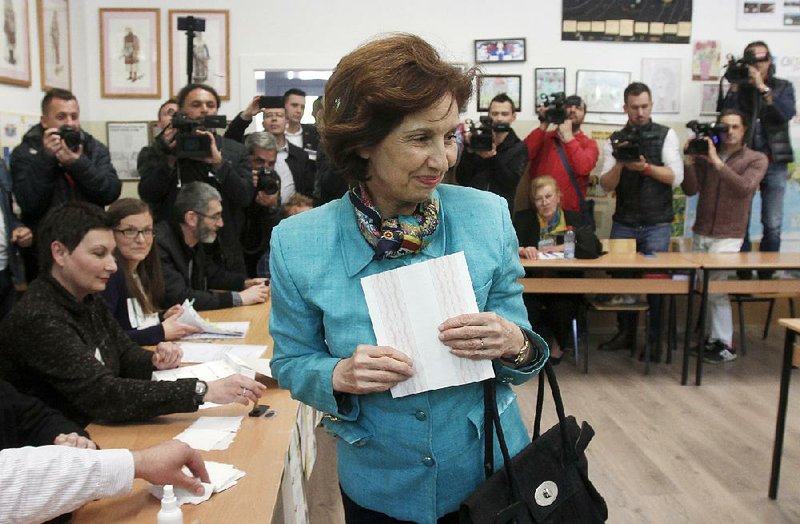SKOPJE, North Macedonia -- A presidential election Sunday gave voters in North Macedonia another chance to give an opinion on their country's new name and tested the center-left government that negotiated the name change to end a decades-old dispute with neighboring Greece.
Polls closed at 7 p.m. (noon CDT). Domestic election observers said the election proceeded calmly, although villagers locked one voting station to protest a lack of road repairs.
The state electoral commission reported turnout of 39.7 percent a half-hour before voting ended.
Three university professors vied for the largely ceremonial presidency. Outgoing President Gjorge Ivanov, who couldn't seek re-election because of term limits, tried to derail or delay the deal with Greece. North Macedonia previously was known as Macedonia.
The name change, which took effect in February, put the former Yugoslav republic on the path to membership in the North Atlantic Treaty Organization and the European Union. Greece had blocked the move for decades, asserting sole rights to the Macedonia name.
The deal emerged as the main campaign issue of the presidential contest. The candidate who was backed by the main conservative opposition VMRO-DPMNE party has vowed to challenge the agreement in the International Court of Justice in The Hague, Netherlands.
Gordana Siljanovska Davkova, a vocal opponent of the name deal, said that as a constitutional law professor who is devoted to the rule of law, she would "respect" the agreement but also "will do my best to show that some of the solutions are against Macedonia's Constitution and against ... the norms of the United Nations."
Stevo Pendarovski, the joint candidate of the ruling Social Democrats and 30 other parties, told reporters after he voted in the capital, Skopje, that he expects North Macedonia to become a full member of NATO and the EU. He said he is a strong supporter of the deal with Greece that "fully preserves the national interest of both countries."
Blerim Reka, a presidential candidate supported by two small ethnic Albanian political parties, expressed hope that North Macedonia will "prove that it is ready for the start of the accession talks with the European Union."
A candidate needs 50 percent plus one vote of the total number of registered voters to win the election outright. Heading into Sunday's vote, a May 5 runoff was seen as all but certain.
More than 3,000 domestic and about 420 international observers monitored the election.
North Macedonia's struggles include a stagnant economy, more than 20 percent unemployment and pervasive corruption. At least 400,000 people, most of them young, have left the country in the past decade.
Some residents hoped for something better. Voter Stefan Kocevski said he expected the election to bring "positivity and change."
"I expect the situation to change for us young people and also changes in the country, our living conditions to improve and to go forward toward European Union and NATO," Kocevski said.
A Section on 04/22/2019
